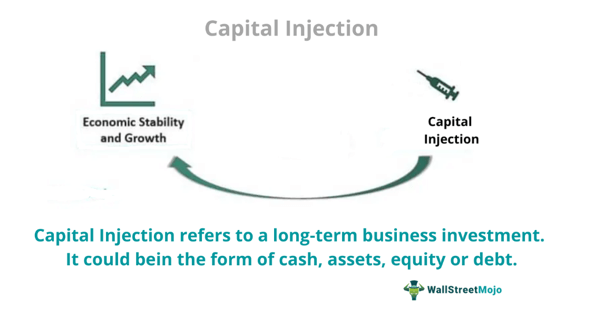Capital injection is a process of infusing funds into a business, investment plan, or project. This injection of capital can take various forms, including cash, assets, debt, or equity. In return for this injection, investors typically receive long-term returns on their investment.
Definition of Capital Injection
When shareholders inject capital into a company, it signifies a shareholder injection. This can happen when existing shareholders put cash into the business. In return for their investment, they might receive additional shares or a promissory note if the injection is in the form of a shareholder loan.
Types of Capital Injections
There are four main types of capital injections:
- Debt
- Equity
- Grants
- Venture Capital
Each type of capital injection has its own set of advantages and disadvantages, so it’s crucial to choose the right one based on the specific needs of the business.
Accounting for Capital Injection
Capital injection is primarily an accounting treatment and not a financing event. Consequently, it does not directly affect the balance sheet of banking activities. Instead, it is recorded as an equity contribution on the income statement.
Importance of Capital Injection
A capital injection is a direct infusion of capital into a company by an investor or a government entity. This injection of funds is crucial for the growth and development of the business. It can help the company expand its operations, invest in new projects, or improve its financial position.
:max_bytes(150000):strip_icc()/syringe3-56912ef43df78cafda818c14.jpg)
Credit: www.investopedia.com
Examples of Capital Injection
Capital injections are often seen as investments made into projects, companies, or investments. These injections typically come in the form of cash, equity, or debt. In some cases, capital injections are made when the recipient is facing financial distress.

Credit: fastercapital.com
Capital Injection Accounts
A Capital Injection Account is a non-operating account that is opened solely for the purpose of receiving the initial deposit required for the incorporation of a new business. This account serves as the repository for the injected capital.
Frequently Asked Questions
What Is The Capital Injection Process?
Capital injection process refers to the method of investing funds in a business, investment plan, or project in the form of cash, equity, debt, or assets. Investors receive long-term returns in exchange for their investment. The injection is recorded as an equity contribution on the income statement, not a financing event.
There are four main types of capital injections: debt, equity, grants, and venture capital.
How Do You Account For Capital Injection?
To account for capital injection, record it as an equity contribution on the income statement. It is an accounting treatment, not a financing event. This doesn’t directly affect the balance sheet but reflects as an equity contribution.
What Happens When Shareholders Inject Capital Into A Company?
When shareholders inject capital into a company, they contribute funds to the business. This injection can be in the form of cash, assets, debt, or equity. In return, the shareholders may receive additional shares or a promissory note if it’s a shareholder loan.
It is a way to provide financial support and help the company grow.
What Are The Different Types Of Capital Injections?
Different types of capital injections include debt, equity, grants, and venture capital. Each type has its own advantages and considerations for businesses.
Conclusion
In conclusion, a capital injection plays a vital role in the financial health and growth of a business. By infusing funds into a company, investors and shareholders can help drive innovation, expansion, and overall success. Understanding the different types of capital injections and their implications is essential for making informed financial decisions.


